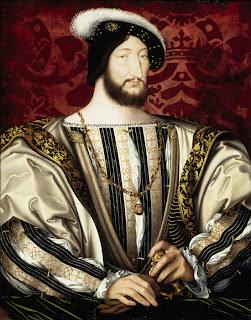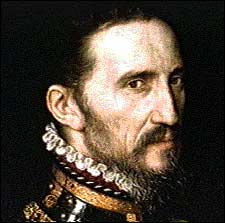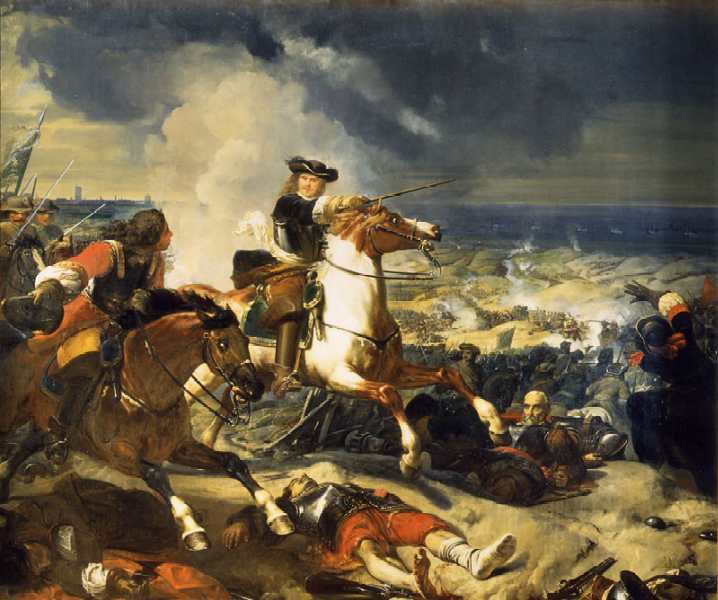Chapter II: Into the abyss
Toulouse, in the citadel, 25 April 1571
de Alva walked into the council room of the governor of Toulouse. Governor Bertaud sat at the table, standing behind him the councilors of the city Toulouse, the captain of the city guard, the captain of the garrison and the masters of the guilds. de Alva stood before the council table and laid down the conditions of surrender. He looked at each of the men present, took a step back and took a copy of the document he had just put down. From it he read aloud
“In the name of the king of Spain, by the grace of God and of Our Lady of Toledo to which we say our thanks, I present you the conditions of surrender.” The captain of the garrison, dressed in a blooded and scorched armor which he had worn every time he had thrown back the Spanish assaults on Toulouse, four times in total, was trembling with rage and grief. A hand was placed on his shoulder by the captain of the city guard to calm him. de Alva saw it, but pretended not to notice, he continued. “In his goodness the king of Spain gives the garrison freedom to leave the citadel unharmed in any way. The city shall be spared of plunder and looting if the citadel surrenders within two hours of the presentation of these conditions. All men who wish to leave, are free to do so. All women are given the guarantee that their integrity shall be spared. A Spanish garrison shall enter the citadel, which shall have free access to trade with the merchants of this city. The cost of this garrison shall be split 60/40 between the Spanish crown and the city. The flag of Toulouse may hang from the walls, but lower than the Spanish flag. No other concessions shall have to be made. Thus wills the king of Spain, ruler by the grace of God.” de Alva rolled up the document and handed it to his aide. “I wish to add something, gentlemen. Do not consider this a capitulation. You have fought brave and skilled, you have withstood the Spanish soldiers four times who drove the Moors from Spain and broke their backs at Tangiers. I salute you, not as a victor, but as a fellow soldier who recognizes true skill and devotion. Since we are not barbarians coming to plunder, but soldiers of the Spanish king who has legitimate claims to this land, we will be working together for many years. Spain welcomes you in its caring arms and from this moment on, we are all equals.” Silence followed, after which de Alva continued “I shall now leave this room and wait two hours with my aides and bodyguards in the room next to this one. As stipulated in the conditions, I shall return in two hours. Enough blood of noble men has been shed, I beg of you to accept these conditions” The general bowed to the council and left the room. Two hours later, the governor handed him the signed document. Toulouse had fallen. In the same month, so fell Béarn, Languedoc and Armagnac.
Berry, on the champs de Mars outside the city, 2 September 1571
“The council meeting is opened” the king spoke, sitting down on his chair in the command tent. Before him and his councilors a big map of France lay on a table. “Tell me the situation”. de Pellefort sighed and reported “We have 14,000 soldiers, the Spanish have an army of 46,000 soldiers gathered around Toulouse. 15,000 Spanish and Portugese soldiers are besieging Labourd, which is still holding on. Scouts have reported that the Spanish army seems to be preparing to split up to cover more ground, which should give us the chance to at least defeat some of their armies while rebuilding our own.” King François I nodded “How about the 21,000 soldiers in Algeria?” de Pellefort looked at de Vergy who busied himself with the matter. “The Spanish are still blocking the coast and the Berber tribes are rebelling. Our army reports that they are almost daily in combat, having already lost the southern provinces of our overseas territory to the Berber tribes. General de Rochemaure is keeping them away from our coastal holdings however” The king nodded and looked at the map. “As talked about before, we shall strike at them in Rouerge. If the Spanish army is splitting up, then we could be able to strike a blow at them there and maybe even take Toulouse back. Then we would have broken the territory they hold in two, cutting them off. Should our fleet be able to break out, we can prevent supplies from reaching them by sea.” He looked up at the councilors which were nodding in agreement. “Any news from de Dampierre?” Cardinal de Tocqueville rolled his eyes and sighed heavily “Other than that he is a reckless fool without manners?” The cardinal unrolled a document which he held “He send me a letter detailing his progress. Of all people, he of course send it to me. He has boarded a merchant vessel in the Provence and is making his way to the fleet through Sardinia, Corsica and Tunis. The letter was send from Spanish-held Corsica, so I guess he is once again dancing on the slippery cord of adventure.” de Vergy frowned and asked de Tocqueville why de Dampierre would send his report to him. He sighed and handed the letter to de Vergy who rolled his eyes on discovering the reason “I must say, cardinal, our admiral has an extended vocabulary to describe the Spanish and, well, everything. He also reported on the brothels of Corsica in very vivid language I must say” The king rose from his chair “Gentlemen, if I may.” de Vergy quickly rolled up the document and pushed it in the hands of the cardinal who quickly handed it to an aide. “Our army shall march to Rouerge, where the Spanish are besieging the town with 14,000 soldiers. Let us pray that God is on our side.” He looked at the cardinal “Cardinal, you shall go to Rome and plead with the pope regarding this matter. We should be fighting the infidels, the Barbary states, not eachother.” Cardinal de Tocqueville nodded in agreement.
Rouerge, 1 November 1571
General de Alva was inspecting the siege barricades when a messenger arrived to hand him the scouts report. The general opened it by breaking the seal, read it and ordered an aide over. “Go to general de Madura and tell him that the birds are preparing to nest.” Puzzled the aide look at him “Just do it, he shall understand” Quickly the aide rushed off, the general continuing his inspection.
Rouerge, 7 November 1571
Smoked filled the air as the French army marched forward. General de Pellefort sat on his horse, surrounded by aides and messengers. To his left stood the French cavalry, waiting for any orders. Four formations of French soldiers were marching towards the Spanish tercio’s which had formed up outside Rouerge. In between the cannons shot at the French, who despite the losses marched on. A French colonel approached the general. “Sir, my apologies that I must trouble you, but I sense something is wrong” The aides of the general looked surprised, but de Pellefort did not. “I know my dear colonel, I know”. 14,000 Spanish soldiers was said, my scouts have reported to have counted around 8,000. Including the 4,000 or so that are needed to maintain the siege, that leaves 2,000 soldiers in an unknown location.” de Pellefort went silent for a while “Then again, it is only 2,000 soldiers. We shall adapt.” The colonel nodded and rode off again.
The French and Spanish soldiers had by now reached each other and were indulging themselves into the art of gruesome warfare. Long pikes were trust in the lines and bodies of the other, while some soldiers ducked underneath them and slashed at each other with daggers. On the right side de Pellefort could see the Spanish cavalry charging. He gave a sign and the French caracole cavalry, the best in Europe, countercharged. In less than fifteen minutes the Spanish cavalry had to retreat and the French were surrounding the Spanish tercios, covering them with their bullets. From his position de Pellefort could see the Spanish line falling back slowly, being pushed back along the whole line by the French. Suddenly a horseman arrived with news from de Pellefort “General, Spanish soldiers are approaching from the west” de Pellefort nodded, smiled and turned to his aides “See, as I said, they will show up and we will adapt. We can handle 2,000 soldiers more” The horseman shook his head “No sir, much more” The general stopped smiling and looked shocked “How much more…?” Trumpets were heard, from behind a nearby hill ridge Spanish flags could be seen, followed by several tercios behind them. de Pellefort lost all color from his cheeks and turned to a nearby colonel “How many do you guess?” The colonel, himself also looking quite pale, counted the flags he could see. He swallowed before he spoke “I think, counting the flags of the divisions, at least 8,000 men. And since the Spanish don’t form up everything in one line…” More trumpets were heard and soon more Spanish tercios appeared from behind a nearby forest line.
General de Alva nodded to himself as he oversaw the battle. The French had gone to battle on lower ground, with the Spanish army having taken the high ground on the western and eastern side of the battlefield during the early hours. As ordered, the French had been lured into combat and drawn into the Spanish lines so retreating was almost impossible. de Madura had moved to make the French think he would besiege Avignon. The moment the French had entered the province of Rouerge, he had broken up the siege and marched to de Alva. With a Spanish massive victory in their grasp as a result. de Alva had given de Madura specific orders. There would be no surrender until dusk, this would be a battle to destroy the French army and break the back of France.
Berry, 13 November 1571
The king sat back in his chair, shocked by what he was hearing, his hands clenched together between his knees. Next to him sat de Vergy, his head down in his hands, his eyes closed. The cavalrier, still bloodied and looking exhausted, continued while wiping away his tears, still in shock from the battle “When the Spanish army approached, general de Pellefort ordered the carré final. We formed up in a big square, the cavalry and where possible the artillery, with the soldiers around us. The Spanish kept attacking, taking no prisoners. It was madness, the Spanish just stood back and let their artillery open up on us.” he sobbed, then regaining himself, he continued, “When we were only a few thousand strong, de Pellefort ordered a sortie of the cavalry to report of the battle. He refused to participate in it however. He dismounted, took up a pike from a fallen soldier and wished us good luck. We sortied with around 300 cavalriers and managed to smash through a weaker part of the Spanish line.”
The cavalry sortie at Rouerge
He paused again, to wipe his tears. The king looked at his advisors, who were split between shock and grief. “A dozen of us got through, the Spanish gave no chase. We rode as long as we could, before our horses gave out. Then we had to walk, sometimes even hide from Spanish soldiers. That is my story, my Liege.” François I nodded, rose and addressed the soldier “You have fought well against great odds, go get yourself patched up and rest.” He turned to an army quartermaster “Provide him and the others with warm food, a bath and rest.” The quartermaster nodded and escorted the cavalrier out.
“de Vergy,” the king said “what is the status of the army in France?” Slowly de Vergy looked up and softly said “Look outside sire, four thousand men. That is the French army.” He sighed “de Pellefort is lost, so is probably his experienced staff.” de Vergy now sank completely into his chair. The king nodded and started walking to the exit of the tent. “Gather the men, I speak to them and tell them that their king is now their general. I will sleep on a field bed like them, wear an armor and lead them into battle myself. Montjoie, Saint-Denis!” The councilors rose as one “Pour la France!” Standing to the side, the eight year old son Henri looked on with amazement. Although he could not understand it all, he knew that his father had took a decision that would make or break France.
Rouerge, one day earlier
de Alva left the citadel of Rouerge on horseback with his personal guard while Spanish soldiers were marching inside. He descended at a nearby inn and, after his soldiers had opened the door and entered the room, made his way to the first floor. The two soldiers standing at the door saluted, moved aside and opened the door. de Alva sat down next to the bed. One eye, three fingers on the left hand, four on the right hand and several wounds on the face that were stitched. Severely wounded, but still alive. de Pellefort had been on the threshold of death, but was pulled back by skilled Spanish army surgeons. He had awoken a few hours before and now looked at de Alva. Upon recognizing the general, he grinned “Nous avons vraiment rasé vos cheveux”, he coughed. de Alva nodded and replied “Nos espagnols avons perdu notre barbe, mais la France a perdu ses bras et ses jambes. Je suis sûr que nous avons cassé votre dos aussi.” de Pellefort looked at him, kept silent for a minute, then replied “Notre dos est plus fort que des soldats, notre dos, ce sont tous le français, c’est notre âme et c’est notre amour pour la France. Vous êtes seulement des bâtards des wisigoths, des sarrasins, des juifs et des romains. Vous ne pouvez pas gagner cette guerre, la France va vous engloutir!”
de Alva smiled. “I thank God every day that my king has send me against you Frenchmen. You fight bravely, with a soul fueled by passion. We Spanish respect your Frankish heritage, the Roman stubbornness and the German ferocity that you hold in yourselves. That is why I thank God, for when victory is achieved, He will have granted me the honor of having defeated the great French beast. But I must say, you French never do lose your prejudices over other peoples, even when defeated.” de Pellefort turned his head away from de Alva “I did not die on that battlefield. God has thus given me the chance to drive you Spanish back into your dark peninsula.” de Alva rose, nodded in salute to de Pellefort and left the room where his aides were waiting. As he left, an aide asked him “Why did you let him survive? He is a skilled general, veteran of many wars and knows the art of war very well” de Alva turned to his aide “Why do you ask questions of me when you answer them yourself?” de Alva continued, left the tavern and rode off to rejoin the army marching further north.
Western Europe at the end of 1571









